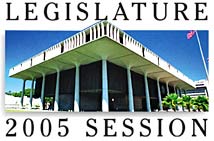Adjournment shifts
lawmakers’ focus
to defending decisions
With work for the 2005 regular session wrapped up, now comes the bigger challenge for lawmakers: selling constituents on the proposals that were passed this year.
|
|
Majority Democrats have touted successes on affordable housing, campaign spending, legacy lands and important agricultural lands.
But the 2005 session could be remembered best for passage of a measure allowing counties to impose a half-percentage-point surcharge on the state's 4 percent general excise tax for the purpose of raising money for transportation projects, particularly a light-rail system on Oahu.
That might be a harder sell to residents already facing skyrocketing housing prices and some of the highest gasoline prices in the state's history.
"I hope that the public realizes that the vote on the general excise tax was a difficult one," said Senate Majority Leader Colleen Hanabusa (D, Nanakuli-Makua).
While counties have the final say on raising the tax, critics say the Legislature should also be blamed for enabling the increase. The measure passed 19-6 in the Senate and 32-19 in the House.
Republican Gov. Linda Lingle has said she continues to review all bills passed by the Legislature before deciding which measures she will veto. She has 45 days to decide whether to sign a bill, veto it or let it become law without her signature.
The excise tax proposal was opposed by all five GOP senators and eight of 10 House Republicans.
Rep. Barbara Marumoto (R, Kalani Valley-Diamond Head), who voted against the surcharge, said, "I cannot participate in gouging more money out of our poor, our seniors and our working families."
But House Transportation Chairman Joe Souki of Maui defended the measure as an effort to do what is right for the long-term prosperity of the state.
"For many of us, we will never see the end result, but we know that the City and County of Honolulu is in a gridlock position and unless something dramatic like rail is done, the problem is going to get continually worse," Souki (D, Waihee-Wailuku) said during debate Tuesday night.
Other business before lawmakers during the interim will be to convene various task forces to study issues in preparation for next year's session:
» Another task force is charged with studying the issue of Class C felonies to determine what additional occupations should be afforded protection under the law. It already is a Class C felony to assault an education, corrections or law enforcement officer.
[News] [Business] [Features] [Sports] [Editorial] [Do It Electric!]
[Classified Ads] [Search] [Subscribe] [Info] [Letter to Editor]
[Feedback]

